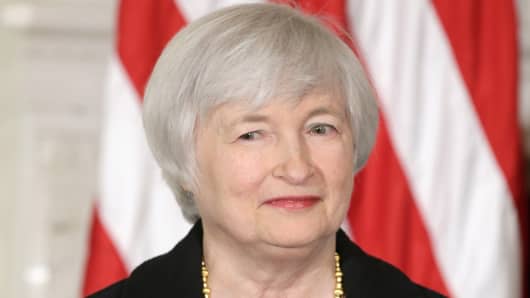First of all, Yellen's impact on the Fed may precede her actually taking office. At her confirmation hearing, she fielded a number of probing questions about her own views and plans as Fed chair. Yellen has been outspoken about the Fed having an obligation to spur employment if inflation is tempered. When asked about tapering, she has made it clear that policies are still working and that the time is not right to do that now.
(Read more: Critics to Yellen: Show some QE regret)
Since Yellen, in her testimony, has virtually come out against tapering, even if her appointment isn't until 2014, wouldn't you be surprised if the Bernanke Fed with her as vice chair voted to taper before year end?
Some at the Fed think that the new policy of "forward guidance" has more promise than QE. What does Janet think? This is one of the things we will be monitoring at her confirmation hearing.
Janet is not Ben. She is known to be more of a dove. But, before we make too much of that, she is also a well-trained economist, with lots of experience at the Fed, who, I do not think, will want to encourage a new round of inflation.
Despite her reputation as a "dove," in a Q&A exchange with Sen. Corker (R-Tenn.), the senator revealed that in all her various times as a voting Fed member, Janet Yellen had voted to raise rates 28 times and has never as a voter on the Federal Open Market Committee voted against a rate hike. That makes her quite some dove, doesn't it? One publication has called her a dove in dove's clothing. I Wonder if they knew of her voting record.
While it is easy to partition Fed members and past chairmen into slots as hawks or doves, that process is more facile than useful. Chairmen need to be right for the times, just like presidents. Paul Volcker's tight money policy in the 1980s was right for the economy then; it, undoubtedly, would not be right for the economy now. The question is whether Janet will get the mix right or not. "For the times," her bent seems to be on the right track.
My issue with monetary policy is that is acting on symptoms and distorting the economy to try to offset some structural problems that may seem to be within its reach but are really beyond its grasp. I'm not sure that the Fed's mandate for full employment should be interpreted in this way.
(Read more: Why Pimco's Bill Gross fears Fed taper)
However, if you look at the top ten states ranked by unemployment rates, the rate over the last 12-months is coming down in those states as fast or faster compared to the national rate drop in all but three of those states. Michigan, Illinois and Georgia are exceptions. Unemployment there is high and stubborn. It appears that the Fed policy of accommodation is still having an impact on lowering the unemployment rate, even where it is highest. As long as that is true, I'll expect Yellen to be wary about letting up on QE — unless, of course, inflation rises.
At that point, we all wonder where she will draw the line. Not surprisingly, we got no insight on that today. For the moment, that question seems more academic than topical. But you will get some to argue that point. In monetary economics, the issues are rarely agreed upon. (Just look at the speech from Philadelphia District Bank President Charles Plosser today.) Fortunately, the FOMC doesn't require unanimity for its policy initiatives. I expect Yellen to be a leader and a consensus builder, much as Bernanke was.
(Read more: Ex-Fed official: I'm sorry for QE)
— By Robert Brusca
Robert A. Brusca is chief economist of Fact and Opinion Economics, an economic-consulting firm in New York City. Prior to that, he was chief economist at Nikko Securities and a financial economist and Fed watcher at Irving Trust. Brusca started his career on Wall Street working at the Federal Reserve Bank of NY, where he was chief of the international financial-markets division. He was also the very first guest on CNBC.


